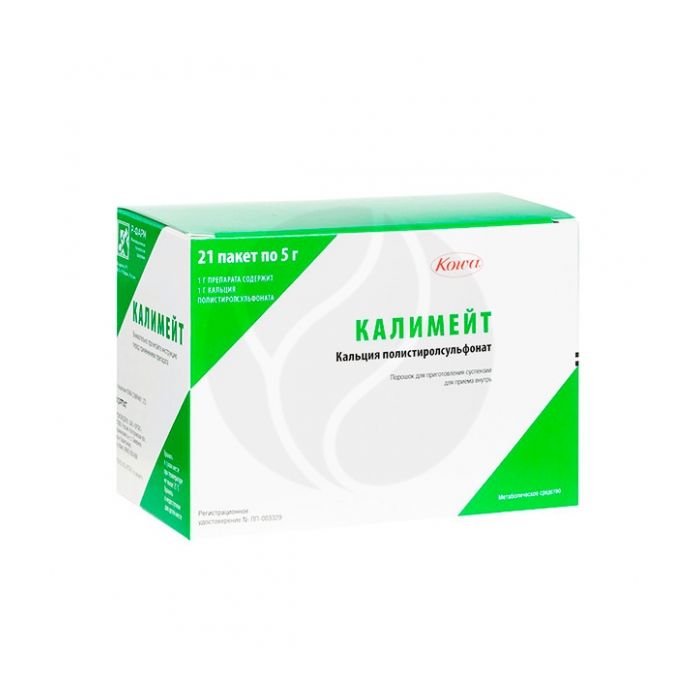Kalimate powder for suspension for oral administration 5g, No. 21
Expiration Date: 05/2027
Russian Pharmacy name:
Калимейт порошок для приготовления суспензии для приема внутрь 5г, №21
Adult patients
The standard daily dose is 15-30 g, which should be divided into 2-3 doses. The drug is diluted in a small amount of water (30-50 ml) or 3-4 ml of sweet food or liquid (except for juices rich in potassium - orange, pineapple, grape, tomato) per 1 g of powder. If necessary, the prepared suspension can be introduced using a gastric tube 2-3 mm thick.
When preparing the suspension, inhalation of the drug should be avoided due to the risk of developing acute bronchitis. The above dose is average and can be individually adjusted depending on the patient's electrolyte levels.
The use of calcium polystyrene sulfonate should be discontinued when the potassium level drops below 5 mmol / l.
Elderly patients (over 65 years) Since elderly patients often have a decrease in the activity of physiological processes, when prescribing calcium polystyrene sulfonate, elderly patients are recommended to carry out more close medical supervision and use smaller doses of the drug.
Powder for preparation of suspension for oral administration is crystalline, from white with a yellowish tint to light yellow, odorless; after mixing with water, a homogeneous suspension of yellowish-white or light yellow color is formed, precipitation may be observed; when manually agitated, the particles easily pass into suspension.
1 g
calcium polystyrene sulfonate 1 g
History of hypersensitivity to polystyrene sulfonate;
intestinal obstruction;
conditions with hypercalcemia (eg, hyperparathyroidism, multiple myeloma, sarcoidosis, metastatic carcinoma);
plasma potassium concentration below 5 mmol / l;
age up to 18 years (due to insufficient data on efficacy and safety);
combined use with sorbitol.
pharmachologic effect
Calcium-containing cation exchange resin. After oral administration in the gastrointestinal tract, the calcium cation of the resin is released into the blood, being replaced by the potassium cation from the patient's blood (mainly in the large intestine), which explains the therapeutic effect of the drug in hyperkalemia.
Unlike sodium-containing cation exchange resins, it does not increase serum sodium and phosphate levels or decrease serum calcium levels in patients with renal impairment. Can be used even in patients with limited sodium intake. In addition, this agent can be used without the risk of the appearance and intensification of the severity of arterial hypertension, heart failure, edema caused by sodium administration.
Pharmacokinetics
It is not absorbed and excreted in the feces in the form of unchanged polystyrene sulfonate resin.
However, there is evidence that particles less than 5 ?m in size were absorbed through the mucous membrane and deposited in the tissues of the RES.
Side effect
From the side of metabolism and nutrition: often - hypokalemia, anorexia; infrequently - hypercalcemia; rarely - hypomagnesemia.
From the digestive system: often - constipation, nausea, stomach discomfort, anorexia; infrequently - vomiting, diarrhea; rarely - intestinal perforation, ischemic colitis or intestinal necrosis, intestinal obstruction.
On the part of the respiratory system: rarely - cases of development of acute bronchitis and / or bronchopneumonia associated with inhalation of calcium polystyrene sulfonate particles have been reported.
On the part of the skin and subcutaneous tissues: rash.
Application during pregnancy and lactation
It is not used in newborns, therefore, the appointment of patients with hyperkalemia during lactation is not recommended.
Application in children
The use is contraindicated under the age of 18 years (due to the lack of data on efficacy and safety).
Use in elderly patients
It is recommended to carry out more close medical supervision and use smaller doses of the drug.
special instructions
Use with caution in patients prone to constipation (risk of intestinal obstruction or perforation); in patients with intestinal stenosis (bowel obstruction or perforation may occur); in patients with gastrointestinal ulcers (exacerbation of symptoms is possible).
Cases of intestinal obstruction and bowel perforation have been reported with the use of sodium and calcium polystyrene sulfonates. In case of occurrence of such phenomena as severe constipation, prolonged abdominal pain, vomiting, it is necessary to discontinue use and take appropriate therapeutic measures. Patients should be advised to seek medical attention if they develop abdominal pain, bloating, vomiting, or other symptoms associated with intestinal obstruction / perforation.
Like other cation exchange resins, calcium polystyrene sulfonate is not selective for potassium cations. Development of hypomagnesemia and / or hypercalcemia is possible. Accordingly, during therapy, the levels of all electrolytes available for determination should be monitored. Calcium levels should be assessed weekly to early diagnose possible hypercalcemia and adjust the dose of calcium polystyrene sulfonate to levels that do not cause hypercalcemia or hypokalemia.
In the case of clinically significant constipation, treatment should be interrupted until normal intestinal motility is restored. Magnesium laxatives should not be used to treat constipation in these patients.
Because in elderly patients, a decrease in the activity of physiological processes is often noted; when prescribing calcium polystyrene sulfonate, elderly patients are recommended to carry out more close medical supervision and use smaller doses of the drug.
Drug interactions
Combined use with sorbitol is not recommended, because cases of intestinal necrosis have been reported with this use.
Cation-exchange drugs can reduce the efficiency of the binding of potassium ions by this agent.
With the combined use of cation-exchange resins and cation-containing antacids and laxatives (including magnesium hydroxide, aluminum hydroxide, calcium carbonate), the development of systemic alkalosis and the formation of calculi of aluminum hydroxide are possible.
When combined with digitalis drugs (for example, digoxin), in the case of hypokalemia and / or hypercalcemia, the toxic effect of digitalis drugs on the heart may increase, especially the occurrence of ventricular arrhythmias and suppression of the atrioventricular node.
When combined with lithium preparations, it is possible to reduce the absorption of lithium.
When combined with thyroxine, it is possible to reduce the absorption of thyroxine.
Calcium polystyrene sulfonate may impair the absorption of fat-soluble vitamins.

